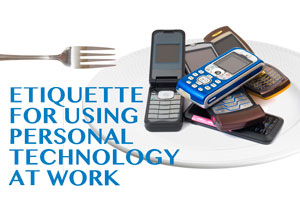February 15th, 2013
 Most companies allow their employees to bring their own smartphones and even their tablets to the office. But does that mean you can–and should–use them whenever you like?
Most companies allow their employees to bring their own smartphones and even their tablets to the office. But does that mean you can–and should–use them whenever you like?
Obviously, each office should have its own policy for appropriate use, but there are several simple rules that all users should follow.
- Mobile devices should be used with discretion. You need to give your full attention to your work and to those with whom you’re speaking or meeting, not allowing your eyes to wander to a new text message or being distracted by a ringing phone. Research has shown that we may not be able to multi-task like we think we can, and you also want to avoid giving the perception that your attention is divided when you’re supposed to be working.
- Smartphones and tablets should be used in the office for work-related activities, not for playing games or updating your Facebook status.
- If you prefer to take notes on your tablet, smartphone or laptop during a meeting, be sure to let your colleagues know what you’re doing. Because smartphones and tablets are usually associated with games, texting and other non-work applications, using them can send the message that you aren’t paying attention. And keep the device on the desk or table in front of you, not on your lap. If you spend the meeting hunched over your device, you’ll miss social cues and signals–like facial expressions–that could be important.
- If you get a non-work, non-emergency call, find a private place to take it–and get off of it as soon as possible. If a client calls you on your mobile number, explain that you’re in the office and ask to move the call to the office phone. If you’re in a meeting, set the phone to silent/vibrate and answer only urgent calls. If you’re expecting the call, let others in the meeting know ahead of time that you may be leaving the room when it comes in.
- Don’t wear your Bluetooth or other wireless headset at the office. Period.
- If you’re running a meeting or a presentation, you have the right to set ground rules for using mobile devices, including asking everyone to turn them off in order to give the session their full attention. If you’re in the audience, follow instructions.
- The mobile devices you’re using may be personal, but if you’re using your company’s Wi-Fi network, or using the devices for work purposes, you need to take precautions to protect your company and yourself from liability if you lose your phone or tablet. If your company doesn’t have an “acceptable use” policy for mobile devices, at least put your own protections in place: set up a PIN number needed to unlock your device. If possible, install an auto-wipe app that will allow you to remotely wipe all the information if your phone or tablet is lost or stolen. And if you’re tech-savvy enough, or can find out how from an expert, encrypt the data on your device so it can’t be read by the wrong people.
- If you’re using a company-issued device, don’t add any apps or tools without requesting permission. Don’t employ it for personal use unless you’ve been given permission to do that, also.
The rise in the use of mobile devices has often blurred the lines of what is appropriate and what isn’t–especially for the younger generation, which has grown up using them, and since the technologies are relatively new and standards have not always kept pace. But etiquette in general is about paying attention to the convenience and comfort of the people you interact with. So even when technology is involved, the basics of good manners apply.
